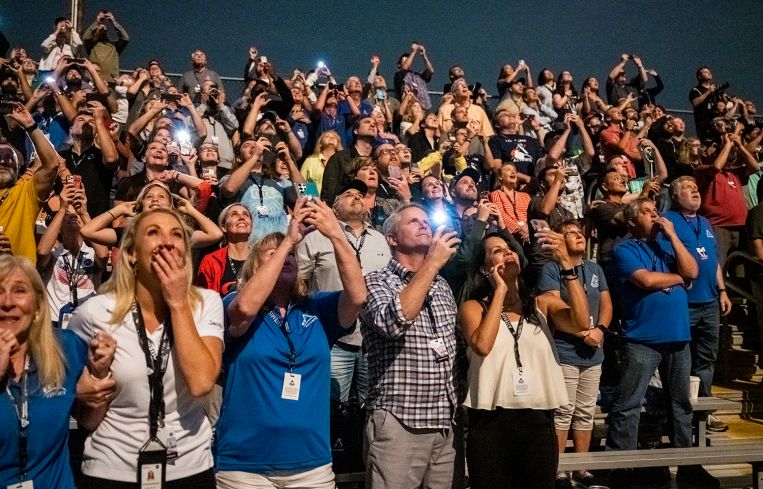Hotel Developers Launch Florida Projects Aimed at Rocket Tourists
The future Westin Resort & Spa Cocoa Beach a few miles from the Cape Canaveral Space Force Station could be just the start
By Jeff Ostrowski April 8, 2024 6:00 am
reprints
During the Cold War, the space race spurred economic development in Central Florida’s Brevard County, earning the region the nickname of Space Coast. Today, private rocket launches are boosting the trajectory of the local hotel market — so much so that hotelier Driftwood Capital is investing more than $400 million to build a high-end resort that will push the envelope on room rates.
“Every single time there’s a rocket launch, all the hotels in the area fill up,” said Carlos Rodriguez Sr., the hotel company’s chairman and CEO. “All of these VIPs that are coming to see these launches have no good hotel to stay at.”
Driftwood Capital aims to break ground in mid-2024 on the Westin Resort & Spa Cocoa Beach, an oceanfront property a few miles south of Port Canaveral and the Cape Canaveral Space Force Station. Plans call for a 502-room resort and a conference center on the 15.7-acre oceanfront property.
“It will be one of the top five resorts in the Southeastern U.S.,” Rodriguez said.
He expects the new Westin Resort to generate average nightly room rates of $450 — a figure he freely admits is well above the Space Coast’s rate range now. In February, the average nightly room rate in the metro area was $171, according to hotel data firm STR.
“The market has changed a lot,” Rodriguez said. “First of all, you have the space race, and all the trillions of dollars that are going into that.”
In earlier iterations of the space program, NASA launched Apollo rockets and space shuttles from Cape Canaveral. Now, much of the action is coming from Elon Musk’s SpaceX, but United Launch Alliance has ramped up activity, and Jeff Bezos’s Blue Origin and others are expected to become active at the Cape, too.
Rob Long, CEO of Space Florida, the state’s aerospace economic development agency, said there were 72 launches from the Cape in 2023, and more than 100 rockets will take off this year.
“The pace has exploded over the past five years,” Long said. “You’re seeing more and more use cases.”
Rodriguez, for his part, expects the number of launches to grow to 300 a year.
Driftwood Capital, headquartered in Coral Gables, Fla., has plenty of insight into the Space Coast hotel market. The company owns a 290-room Crowne Plaza and a 295-room Hilton in Cocoa Beach, and it operated a hotel on the site of the future Westin, but razed it to make way for the development.
Because of the current lack of high-end hotels, visitors with a taste for luxury stay in Orlando, then make the hourlong drive to the Atlantic coast, said Rodriguez.
Compared to glitzier areas of Florida, Cocoa Beach has always been affordable. In “The Right Stuff,” the classic 1979 account of the birth of the space program, author Tom Wolfe sneered at Cocoa Beach’s sand as “hard as a brick” and dismissed the town itself as decidedly downscale.
“Cocoa Beach was the resort town for all the Low Rent folk who couldn’t afford the beach towns farther south,” Wolfe wrote. “Cocoa Beach was so Low Rent that nothing on this Earth could ever change it.”
Rodriguez aims to prove Wolfe wrong. Cocoa Beach is evolving, and the latest shift will add luxury lodging to the resort town’s middle-market inventory. “It will be a transformational project,” Rodriguez said of the Westin Resort. “There’s absolutely nothing close to it.”

As part of its development plan, Driftwood won a $30 million grant from Brevard County to include a conference center at the resort, located at 1300 North Atlantic Avenue.
Rodriguez said he makes development decisions based on basic economic factors. He looks for demand drivers such as a busy schedule of rocket launches.
Of course, space booms can go bust, too. The end of the space shuttle program in 2011 delivered a blow to the Space Coast, which lost thousands of jobs related to that activity. But the burgeoning schedule of private space launches has picked up the slack.
Rodriguez also scouts for constrained supply. On that front, he was both frustrated and heartened by the scarcity of oceanfront land along the Space Coast.
“It’s very difficult to approve anything of height or density. There’s an anti-development flavor there. You basically need to win them over,” Rodriguez said. “It took me seven years and a referendum to get approval.”
In another sign of its bullishness on the Space Coast, Driftwood also is developing a $68 million Element by Westin in Melbourne, Fla., about 20 miles south of Cocoa Beach. That hotel is expected to open in June. Once the Westin Resort opens, Rodriguez hopes, the luxury entrant will allow other hoteliers in the market to boost their room rates.
The Space Coast is far from Driftwood’s only focus. The company manages 87 hotels with 16,000 rooms nationwide.
The company is developing new hotels across the country, including the Element by Westin Mission Valley in San Diego and Riverside Wharf in Downtown Miami. The Miami project is a $267 million mixed-use development on the Miami River that will feature a Dream Hotel.
Driftwood’s diversified rental streams include not just developing and owning hotels but also lending to other hoteliers. As capital grew scarce, the company made loans to hotel owners, either to refinance expiring mortgages or to allow franchisees to meet the renovation requirements imposed by national brands.
“When financial institutions tightened up on their lending, that created the opportunity for lenders like us to bridge the gap,” Rodriguez said.
Lenders view hotels as high-risk properties, and they typically offer loan-to-value ratios of just 50 percent. Driftwood makes loans for an additional 5 percent to 10 percent of a property’s value. “We take the riskier portion of the loan, and the bank is happy that we’re doing it,” Rodriguez said. “We’re sort of an insurance policy for them.”
Driftwood charges a premium for its financing, which can cost about 10 points over the Secured Overnight Financing Rate, a key borrowing metric tied to U.S. treasuries. Rodriguez said the stricter underwriting requirements have brought stability to the hospitality sector.
“Financial institutions have always viewed hotels as a different animal,” he said. “That has been a blessing. As a result of the tougher underwriting that hotels have been under for many, many years, you don’t see as many hotels in trouble.”
Jeff Ostrowski can be reached at jostrowski@commercialobserver.com.



